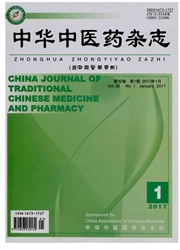

 中文摘要:
中文摘要:
目的:制作食积肺炎动物模型,探讨银莱汤对动物模型肠黏膜机械屏障的作用机制,证明肺与胃肠同治理论的有效性,为指导临床疾病的防治提供实验研究依据。方法:实验小鼠随机分为正常组、感染组、食积组、食积感染组、食积治疗组、食积感染治疗组。制作食积肺炎动物模型,给予银莱汤治疗,观察实验各组肠黏膜形态学变化、肠组织ZO-1及血清内毒素水平。结果:食积组、食积感染组小鼠肠黏膜上皮细胞及杯状细胞增大增多,排列紊乱;食积治疗组、食积感染治疗组肠黏膜上皮细胞及杯状细胞排列整齐。食积组、食积感染组小鼠肠组织ZO-1水平较正常组显著下降(P〈0.01);食积治疗组显著高于食积组(P〈0.01);食积感染治疗组显著高于食积感染组(P〈0.01)。各组小鼠血清内毒素水平与正常组比较均无显著性差异。结论:肺与胃肠积热会影响肠黏膜分泌功能,造成肠黏膜机械屏障损伤,其损伤机制与肠黏膜ZO-1的破环有关。银莱汤能够调节肠黏膜分泌功能,修复肠黏膜ZO-1,对肠黏膜机械屏障具有保护作用。
 英文摘要:
英文摘要:
Objective: By establishing dyspepsia pneumonia mice model to discover the mechanism and effect of Yinlai Tang on mice's intestinal mucosal mechanical barrier, to prove the validity of the treatment of lung and stomach-intestine together, in order to provide a laboratory data to guide prevention and treatment of clinical diseases. Methods: The mice were randomly divided into normal group, infected group, dyspepsia group, dyspepsia-infected group, dyspepsia treated group, and dyspepsia-infection treated group. After the dyspepsia pneumonia mice model was established, the mice were treated with Yinlal Tang. And the morphological change of intestinal mucosa, intestinal mucosa tissue ZO-1 level and serum endotoxin level in each group were observed. Results: Intestinal mucosa epithelial cells and goblet cells in dyspepsia group and dyspepsia-infected group were enlarged, increased and disorganized, while the cells in dyspepsia treated group and dyspepsia-infection treated group were organized. The level of intestinal tissue ZO-1 in dyspepsia group and dyspepsia-infected group was significantly lower than that in normal group (P〈0.01), the dyspepsia treated group was higher than dyspepsia group (P〈0.01); the dyspepsia-infection treated group was significantly higher than dyspepsia-infected group (P〈0.01). Compared with normal group, there was no difference on the serum endotoxin level. Conclusion: The heat retention in lung and stomach-intestine can influence the secretive function of intestinal mucosa, which can cause intestinal mucosa mechanical barrier. The mechanism of injury may be related to the damage of intestinal mucosa ZO-1. Yinlai Tang can regulate the secretive function of intestinal mucosa, repair intestinal mucosa ZO-1, and provide a protection for intestinal mucosa mechanical barrier.
 同期刊论文项目
同期刊论文项目
 同项目期刊论文
同项目期刊论文
 期刊信息
期刊信息
